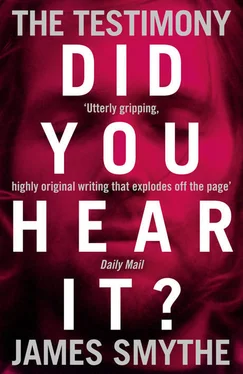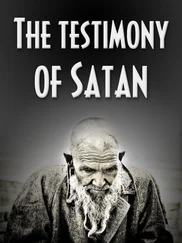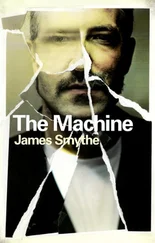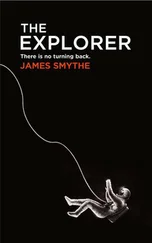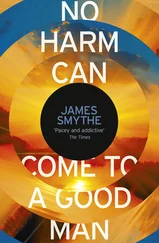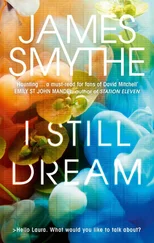James Smythe - The Testimony
Здесь есть возможность читать онлайн «James Smythe - The Testimony» — ознакомительный отрывок электронной книги совершенно бесплатно, а после прочтения отрывка купить полную версию. В некоторых случаях можно слушать аудио, скачать через торрент в формате fb2 и присутствует краткое содержание. Город: London, Год выпуска: 2012, ISBN: 2012, Издательство: Blue Door, Жанр: Фантастика и фэнтези, Триллер, на английском языке. Описание произведения, (предисловие) а так же отзывы посетителей доступны на портале библиотеки ЛибКат.
- Название:The Testimony
- Автор:
- Издательство:Blue Door
- Жанр:
- Год:2012
- Город:London
- ISBN:9780007467723
- Рейтинг книги:4 / 5. Голосов: 1
-
Избранное:Добавить в избранное
- Отзывы:
-
Ваша оценка:
- 80
- 1
- 2
- 3
- 4
- 5
The Testimony: краткое содержание, описание и аннотация
Предлагаем к чтению аннотацию, описание, краткое содержание или предисловие (зависит от того, что написал сам автор книги «The Testimony»). Если вы не нашли необходимую информацию о книге — напишите в комментариях, мы постараемся отыскать её.
What would you do if the world was brought to a standstill? If you heard deafening static followed by the words, ‘My children. Do not be afraid’?
Would you turn to God? Subscribe to the conspiracy theories? Or put your faith in science and a rational explanation?
The lives of all twenty-six people in this account are affected by the message. Most because they heard it. Some because they didn’t.
The Testimony
The Testimony — читать онлайн ознакомительный отрывок
Ниже представлен текст книги, разбитый по страницам. Система сохранения места последней прочитанной страницы, позволяет с удобством читать онлайн бесплатно книгу «The Testimony», без необходимости каждый раз заново искать на чём Вы остановились. Поставьте закладку, и сможете в любой момент перейти на страницу, на которой закончили чтение.
Интервал:
Закладка:
I sat in a pew, or what was left of it, and I tried to phone Anastasia but her phone was off, or there was no reception, I forget, and then I went to the fonts, found that there was water still in them, I don’t know how, because you would think it would have evaporated in the flames. I blessed myself, headed back the way I came in, and was about to leave when I saw the bodies at the back of the church, piled up, dust and skeletons and burned flesh and robes, all the priests from before, the ones who the city said lied to them. As I got closer I saw that it wasn’t a pile; they had been huddled together, and I was so angry at myself that I was even in that crowd the first day.
Ed Meany, research and development scientist, Virginia
They launched a second barrage – we weren’t even told on the intranet, so we only found out when the satellites were moved to cover more southern areas of the country. The missiles slammed into cities, with towns, and the damage levels varied depending on conditions that we didn’t even know. This was civilian populations, factories, hospitals, schools. We started getting messages from the White House central computers every time a target – so, not the cities, but something that might actually be worth bombing – got struck, so when they took out what they believed to be a silo we had a blunt message about what was destroyed. They took out a factory, the place that they believed was manufacturing weaponized airborne agents. This might have been where they manufactured the sickness that we’ve all been suffering, the notes said. Sure, I thought. Sure. There was lots of tech stuff, computer stuff that the engineers needed help with, and the way that we were fractured around on the floors meant that the banks of computers were a couple of floors up, so they called up my team to give them a hand. I know, I said, they should have sorted this out, been prepared, but when you’ve got a maniac at the controls, who can predict these things? (We were all in agreement that the VP wasn’t in his right mind, because this seemed totally unfair, totally unacceptable. But then, you’d occasionally look at the TV and see the hospitals, the people still ill, crying on the steps, or you’d see the reports with the estimated numbers of dead, and you’d almost see where he was coming from.)
I didn’t go, because I’m not a computer person; I’m a things man. I had my stuff, the bodies and the microscopes and the labs down here, and I had everything from The Broadcast , all our sheets of useless paper and reports and stuff that meant nothing, that told us nothing. I had my laptop, and I stayed to work on that. After a few minutes I called for Sam, to see if he was alright, and the girl who answered the phone told me that he had killed himself, hung himself. She didn’t sugar-coat it or ask if I knew him well, nothing like that, or even say that she was sorry. I don’t know.
Hassan Shah, teacher, Kerman
I remember, we were all terrified. We were, all of us, ready to do anything we could to get out, but that was all but impossible. Before this, in the decades before, when war happened – or when we were caught up in other people’s wars, stuck in the middle and made to sign treaties, treated with suspicion for years and years no matter who you actually were – we knew everything that was going on. We knew because we had the news, we had CNN and the BBC coming down through the satellites. It made a huge difference: even on the worst days we would crowd into one of the bars that had paid for the television, and we would watch what was going on, the stuff that we weren’t being told. We would be told numbers of how many people were dead, for example. We would be told how they died, and where the next lot were likely to die. It was useful. This time, we were accused because our country once gave birth to a man who decided he liked bombs, and then because people started dying to coincide with his promises of genocide. We didn’t know where it came from, the sickness, but it killed our people as well; it was indiscriminate. Terrorists are rarely indiscriminate.
After The Broadcast , when people started dying, we had no choice but to pile the bodies up outside the hospitals, in the streets. The hospitals were already full before, because they’re never empty. More people just meant even more of a wait to see a doctor, or get a room, and they all died before they even got through the doors, for the most part. I stood back and watched them. I run – ran – a school, which everybody would say was noble. I was one of the few who spoke English, which meant a lot; I translated everything we saw on the news, first, and I spoke to reporters when they came in, second. My school was directly across from the largest hospital in Kerman, which meant we saw it most of all. We shut the school quickly, but I kept going in, because otherwise thieves and looters would move in, take everything we had, destroy the place. The people got out of control easily. I watched my wife die, and then my daughter. My only son had died when he was born, so he was spared seeing the rest of his family grind to their halts. Guita, my wife, died of something, I don’t know what, but her throat got sore and her eyes started weeping and her lungs coughed blood before she stopped breathing. Tala, my daughter, fell off a wall weeks before and broke her leg badly, so badly that the bone was through the skin, and it wasn’t yet healed. The skin turned black, and the pain was so bad that she passed out, and never woke up. They died within hours of each other, like how a wall crumbles: bricks fall because other bricks have already fallen. I waited to see when it would be my turn, and I waited in the school.
We didn’t know about the bombs, the missiles; we didn’t have a clue, because the satellites were down, the televisions giving us nothing but static. Interference. The first one hit about twenty miles away, and I watched it from the window at the top of the school. It fell as if it were a meteor, just a ball of light fizzing downwards. I remember how, one year when I was younger, somebody had fireworks. We didn’t ask how they got them, and we lit them – I was still really just a child, then, so I didn’t think anything of it, but we were scared of being caught – we went out into the countryside and lit them and they flew up and exploded, but the best part was watching them as they fell when they were done, the embers of them, the trails. We were so young we didn’t think about the people that they might have frightened. That was how the missile fell: it dropped, and it trailed, and it glowed like it had been on fire, but this was the end of the journey. I thought, for a second, that it might have been to do with The Broadcast , that maybe it was a sign, a flare: something falls from the sky, from the heavens, maybe this is something for us to think on. But then the bang followed seconds later – like thunder, a clap – and the smoke blossomed up, and I thought, Well, this is the end. I think I even said it aloud, to myself, in that room.
I didn’t know exactly how far away the blast was, or how long we had – I didn’t know if it was here already, and our fates had been sealed, and the smoke would come to get me, the radiation already having killed me, I just didn’t know it yet – so I ran downstairs, out to the front, shouted that if people weren’t sick, they could come here, come with me. Nobody did, because everybody that was out on the streets was sick, it seemed, and they all thought that they were going to die. Then I saw it, over the buildings at the back of the city: a cloud of green smoke, like something from a Hollywood film, rising into the air. We all knew that the government had laboratories back there, and we didn’t ask what they were working on, but I saw it and it made me feel sick, because I knew that it would only make this whole situation worse. I ran to the back of the school – the ground was shaking, like aftershocks, but I don’t know if that was real or just my mind playing tricks, or maybe just my legs, my muscles reacting to the stress, to the terror – and I went to the basement. We had a basement put in, before all of this, back when the problem was a threat, not a reality, and a far-fetched threat that we would almost take for granted would never actually be realized, and we filled it with cans of food, a variety of different sources of fuel. It’s like a nuclear shelter, somebody had said; they built them in America in the 1950s, when they were scared of Russia, scared that they would be attacked and have to run to their gardens. They’re always on television, and in films. I opened it up, saw how much space there was – I had never even been in there since we built it, because there wasn’t a reason, so we kept it locked, and I had the only key. It was big enough for thirty, forty people, maybe, cramped, but big enough, and it might save their lives. I went back to the street, but there was nobody around, because they had seen the smoke and run themselves, and they didn’t want to come around to the area because of the pile of bodies anyway, even though they were under sheets. The school used to be one of the busiest parts, and then people wouldn’t go near it. It was all too much for them, I think, but I didn’t want to be in there alone, not when I finally shut the door and waited for the madness to pass.
Читать дальшеИнтервал:
Закладка:
Похожие книги на «The Testimony»
Представляем Вашему вниманию похожие книги на «The Testimony» списком для выбора. Мы отобрали схожую по названию и смыслу литературу в надежде предоставить читателям больше вариантов отыскать новые, интересные, ещё непрочитанные произведения.
Обсуждение, отзывы о книге «The Testimony» и просто собственные мнения читателей. Оставьте ваши комментарии, напишите, что Вы думаете о произведении, его смысле или главных героях. Укажите что конкретно понравилось, а что нет, и почему Вы так считаете.
